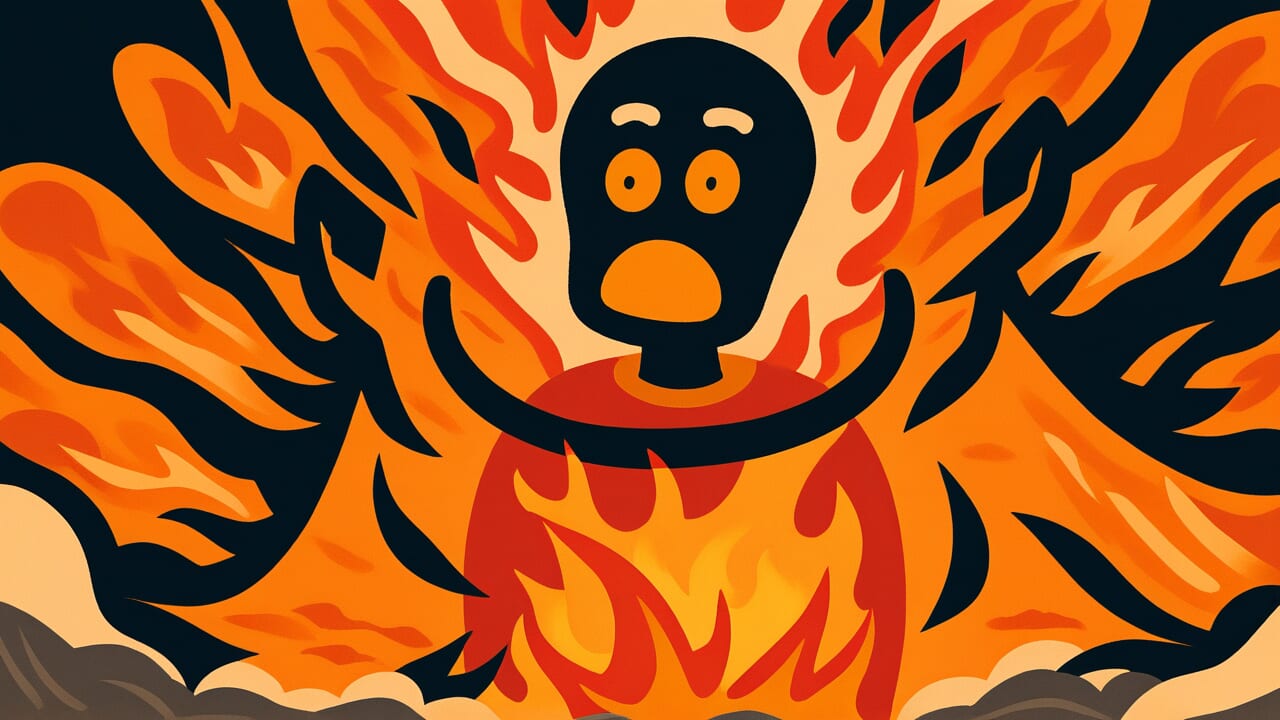How to Read “If you don’t extinguish the small flames, what can you do about the big blaze”
Enen ni messezunba enen wo ikansen
Meaning of “If you don’t extinguish the small flames, what can you do about the big blaze”
This proverb means that small flames will eventually become a big fire if left unextinguished. It warns us to deal with problems while they’re still small.
Problems and troubles may seem trivial at first. But if you ignore them, they grow bigger and bigger. You can easily put out a small spark, but once it spreads, it becomes uncontrollable.
People use this proverb when they want to warn someone while a problem is still manageable. The fire metaphor clearly conveys the urgency: “If you don’t deal with this now, it will become serious.”
This lesson applies to many modern situations. Small misunderstandings in relationships, minor mistakes at work, or slight health issues all fit this pattern. Things that are easy to fix early can become irreversible disasters if you put them off.
Origin and Etymology
This proverb is believed to come from Chinese classics. It uses two words: “enen” and “en-en,” both meaning fire or flames. However, “enen” describes small flames, while “en-en” describes large, raging flames.
The old expression “messezunba” means “if you don’t extinguish.” “Ikansen” means “what can you do” or “it’s hopeless.” Together, the proverb warns that if you don’t put out small flames, you’ll be helpless once they become a big blaze.
Ancient Chinese philosophy contains many teachings about handling things while they’re still small. This proverb follows that tradition. By using the concrete, easy-to-understand example of fire, it powerfully conveys the danger of ignoring problems.
After reaching Japan, this lesson was widely accepted. In an era when fires posed a major threat, the teaching to never overlook small sparks resonated deeply with people, both literally and metaphorically.
Usage Examples
- We ignored small complaints within the company, and now, as “If you don’t extinguish the small flames, what can you do about the big blaze” warns, morale has dropped across the entire department
- Even a child’s irregular lifestyle follows “If you don’t extinguish the small flames, what can you do about the big blaze,” so we need to correct it early
Universal Wisdom
Humans have a tendency to look away from small problems. We think “It’s still okay” or “It’ll work out somehow,” and we postpone dealing with them. Why?
Because facing problems is troublesome or unpleasant. Even small problems require effort to solve. Humans instinctively prioritize comfort in the present moment.
Also, we try to escape anxiety by thinking optimistically: “This much is fine.”
However, problems have a nature to grow. Small cracks widen over time. Small misunderstandings accumulate into major conflicts. Like spreading fire, problems naturally expand when left alone.
This proverb has been passed down for hundreds of years because it understands this human weakness. Our ancestors learned from experience.
They must have witnessed many cases where dismissing small problems led to irreversible situations.
That’s why this proverb continues to hold power as a warning. It reminds us of the importance of acting now and not overlooking small signs.
When AI Hears This
Looking at how fire spreads chemically, you realize this lesson is remarkably sound. Combustion isn’t just heat transfer—it’s a special process called a chain reaction.
When wood burns, heat breaks down molecules to create “radicals,” highly reactive substances. These radicals react with surrounding molecules to create new radicals, which trigger more reactions.
One reaction becomes two, then three—multiplying exponentially. At the small flame stage, the number of chain reactions is still limited.
But once it passes a critical point, the heat energy generated continuously supplies the activation energy needed to start reactions in surrounding materials.
Fire extinguisher powder and carbon dioxide work not just by cooling with water, but by chemically bonding with radicals to break the chain. In the early stage, a small amount can stop the chain.
But after the critical point, you need many times more.
This proverb teaches us to deal with problems before they expand exponentially. It perfectly describes the chemical mechanism of fire. Ancient people didn’t know chemical formulas, yet they grasped the essence of chain reactions through experience.
Lessons for Today
This proverb teaches modern people the action principle: “Don’t put off until tomorrow what you can do today.”
Modern society is busy, and we’re often overwhelmed by immediate tasks. That’s why we postpone small problems and discomforts, thinking “I’ll deal with it later.”
But by the time “later” comes, the problem may already be too big to handle.
What matters is focusing on “signs” rather than the “size” of problems. A slight discomfort in relationships, a small change in health, a minor mistake at work—these might all be signals that something is beginning.
Early action has major benefits. It requires less effort, and you have more options available. When problems are small, you can respond flexibly.
In your life right now, is something bothering you? Is there a small problem you’re putting off? It might be a small flame you can still handle.
By facing it with courage, you can prevent major difficulties in the future.



Comments